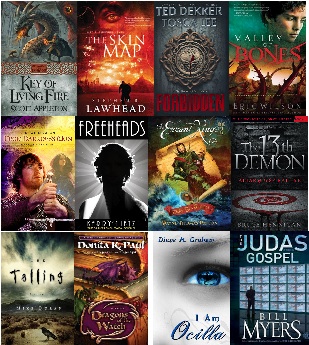Speculation VS. Speculative Fiction
It’s disconcerting to find the word “speculation” used in the Bible in a negative way, especially since so many speculative novelists bend over backwards to convince believers that no, fantasy is not evil; nor is science fiction or the other sub-genres that fall into the catch-all term “speculative fiction.”
 I saw the word speculations pop up in a most disconcerting way in Romans 1. After Paul’s greeting to the Roman believers he hopes to visit, he goes to some length to explain the slide into sin which humankind has experienced. Early in the process, he identifies this cause:
I saw the word speculations pop up in a most disconcerting way in Romans 1. After Paul’s greeting to the Roman believers he hopes to visit, he goes to some length to explain the slide into sin which humankind has experienced. Early in the process, he identifies this cause:
For even though they knew God, they did not honor Him as God or give thanks, but they became futile in their speculations, and their foolish heart was darkened. (Rom. 1:21)
As it turns out, only the New American Standard Version uses the word speculations. Other translations say thoughts, imaginings, reasoning. I’m not sure that helps much. One of the things we speculative writers say over and over is that the imagination is God-given, that there is nothing wrong with pretend, that rational people know the difference between what is real and what is made up—such as the difference between Santa Claus and Jesus.
The verse gives me pause, however. What did Paul mean? Is there something futile in our fantasies and science fiction stories? Are we walking along the path of departure from God that Paul was describing?
I don’t think so.
First, the word speculative and the term speculative fiction don’t mean anything remotely related to one another. Well, OK, maybe remotely. According to the Oxford American Dictionary, speculative is defined as the following: “engaged in, expressing, or based on conjecture rather than knowledge: discussion of the question is largely speculative.” Speculation is defined as “the forming of a theory or conjecture without firm evidence: there has been widespread speculation that he plans to quit | this is pure speculation on my part | these are only speculations.”
The term speculative fiction isn’t even in the dictionary. For that definition I went to Wikipedia: “Speculative fiction is a broad genre encompassing fiction with certain elements that do not exist in the real world, often in the context of supernatural, futuristic or other imaginative themes. This includes, but is not limited to, science fiction, fantasy, superhero fiction, horror, utopian and dystopian fiction, supernatural fiction as well as combinations thereof (e.g. science fantasy).” In following the footnotes, I learned that part of that definition comes from an online digital dictionary, whose “main, proprietary source is the Random House Unabridged Dictionary.”
It seems apparent to me that the two terms are not talking about the same animal. As I understand the idea of speculation, the theory of evolution is more akin to the concept Paul was laying out for his readers than is speculative fiction. (I know many will dispute that idea, but there still is no hard evidence that non-mammals became mammals or non-sentient beings became sentient).
For one thing, we have the advantage of the added word: fiction. What speculative writers write are novels and short stories. We are not writing theology or science or history (except perhaps alternative history, and then the idea of “not the way it actually happened” is pretty clear.)
I think the point of contention comes from the idea that speculative authors are writing about things “that do not exist in the real world”: elves, aliens, dwarfs and fairies, and the like. That we write about make-believe worlds like Narnia or imagined times like Middle Earth. That we write about things that have not now and may not ever happen, like sentient robots or space travel to places where other species live.
It’s actually odd that some of the criticism about speculative literature from some Christians comes because we write about things that are real, like witches and angels and demons.
 I’ll be honest: I don’t particularly enjoy supernatural stories. There are indeed real angels and real demons, but rarely have I read a story that aligns the supernatural beings about which they write, with anything true from Scripture. The same is also true about witches or divination. In other words, what the Bible refers to and the pretend beings in the speculative stores are not the same.
I’ll be honest: I don’t particularly enjoy supernatural stories. There are indeed real angels and real demons, but rarely have I read a story that aligns the supernatural beings about which they write, with anything true from Scripture. The same is also true about witches or divination. In other words, what the Bible refers to and the pretend beings in the speculative stores are not the same.
I’ll admit that the line is not as clear when we write about actual known beings as opposed to purely imagined beings. So for example, writing about something that is not such as elves or something that may become an actuality in the future such as human clones, but is not one yet, is different from writing about angels that actually are, now, in existence.
Sort of.
I mean, “realistic” fiction is all built on writing about characters that are like real people but are themselves made up. In most instances, readers are not confused. They understand they are reading a pretend story, one that did not actually happen, the characters are not real people, even though they talk and act in ways that real people do.
So the first point to understand is that stories of any kind, including speculative stories, are not real and they are not trying to relate real events about real people or real beings.
Second is this (which has been touched on before here at Speculative Faith): by telling imaginary stories, authors can at times reveal something true that no amount of explaining could do.
Paul was not referring to anything pretend. His point about “futile speculations” is that some people create ways to dismiss God, to act as if He does not exist or as if He is not sovereign. Their “foolish heart was darkened,” meaning that they no longer can see the truth that God has made so evident within creation.
If speculative fiction makes the truth of God more evident, not less, these stories are far from “futile.”








































I believe it was Robert A. Heinlein, Golden Age science fiction writer, who coined the phrase “Speculative Fiction.” He meant it to only include science fiction and fantasy, but the meaning of the term has expanded somewhat.
I believe he used the word “speculative” because this kind of fiction writes about worlds that could be rather than worlds that actually are or have been.
You are entirely right to say that “futile speculations” refers to thinking that rejects God–however, that kind of thinking has occurred at times in writing by science fiction and fantasy authors. Such as the overall tenor of the works by Robert A. Heinlein…
I agree, Travis. Much speculative fiction is also futile speculation, but so is much realistic fiction. The genre does not influence whether or not a writer speaks the truth about God, or not. And that’s the point that a lot of people opposed to Christian speculative fiction don’t understand. They miss the “Christian” part, which I would assume gets included because writers want to identify with the truth about God.
Becky
I think they may also be missing how much a great deal of so-called “non-fiction” contains “futile speculation.” For example, I like the Biblical Archaeological Review, but some of the stuff they record as being true about the Bible at times is both speculative and also contrary to what the Bible actually says…